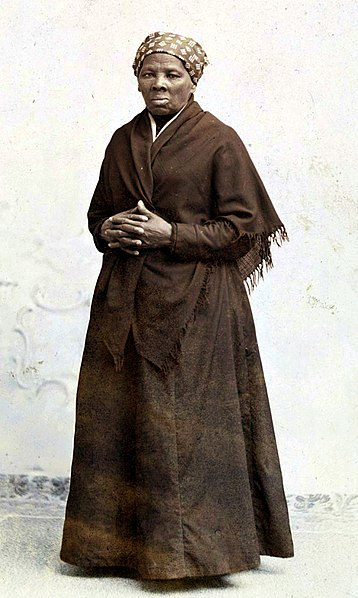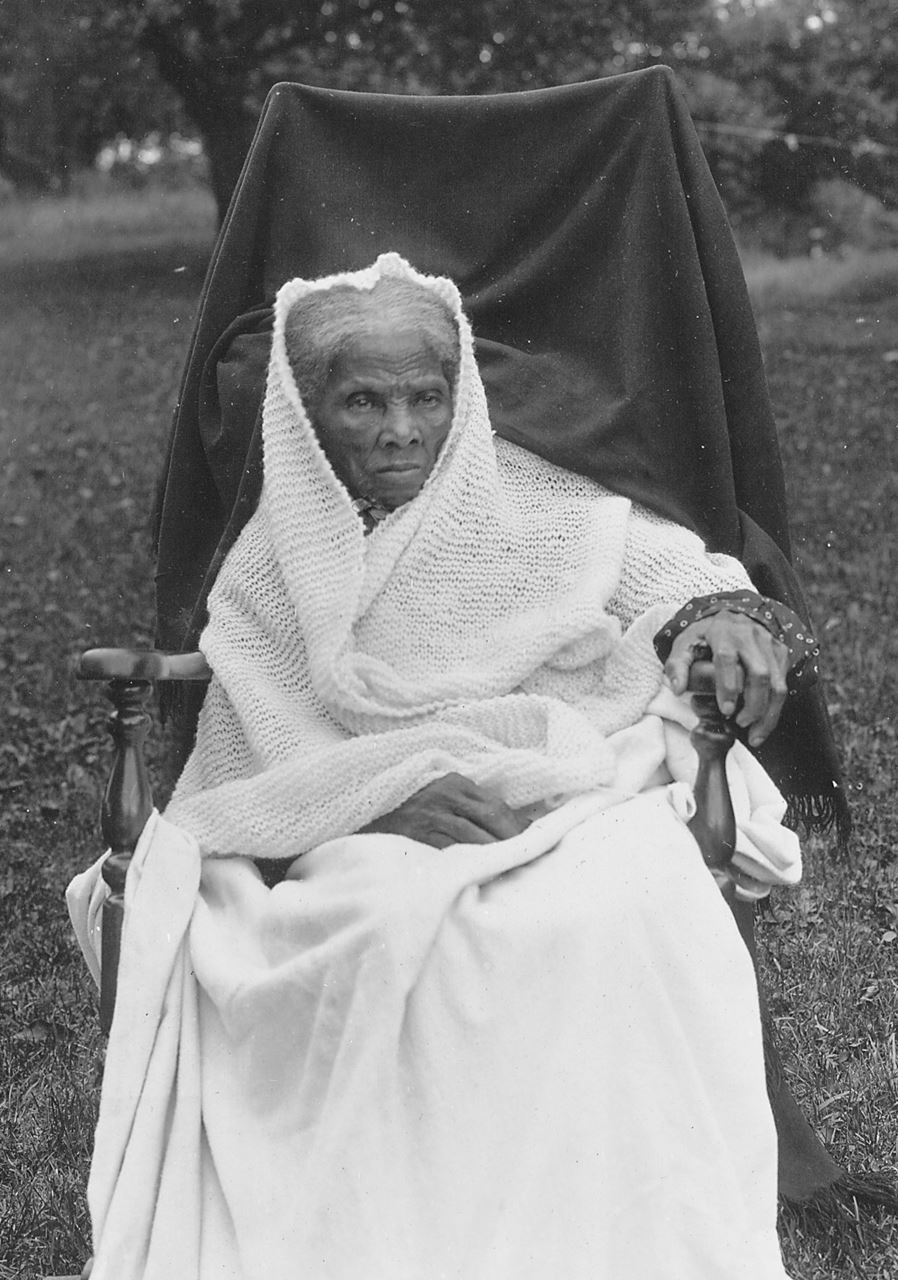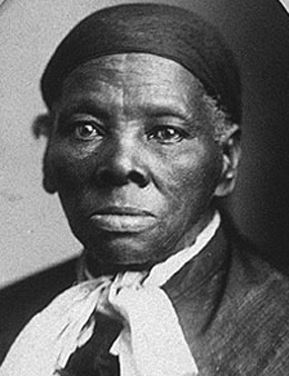 Portrait of Harriet Tubmanwww.biography.com/people/harriet-tubman-9511430.
Portrait of Harriet Tubmanwww.biography.com/people/harriet-tubman-9511430.
Harriet Tubman: A Forever Hero
“The midnight sky and the silent stars have been the witnesses of your devotion to freedom and of your heroism. Excepting John Brown—of sacred memory—I know of no one who has willingly encountered more perils and hardships to serve our enslaved people than you have” (Douglass). Frederick Douglass, a renowned abolitionist during the time of slavery, praises the work and heroism of Harriet Tubman, as we still do today. Harriet Tubman was born into slavery and suffered a harsh childhood on the Brodas Plantation of Dorchester County, Maryland. She is most famously known for her work on the Underground Railroad after her escape in 1849. The emergence of the Civil War brought a halt to the Railroad, but Harriet continued to partake in the abolishment of slavery as a cook, nurse, scout, and spy for the Union. Tubman dedicated her life to abolishing slavery and improving the lives of her people, and as Douglass described, she faced adversities along the way. Heroes are everyday people that walk beside us on the street, going unrecognized. They may earn fame over time as most heroes do, but their intentions were pure. True heroes don’t seek the publicity that is brought forth with carrying out good deeds, unlike celebrities. A hero has to be the change they want to see in the world, which is said by many and accomplished by few. If someone has the appropriate mindset of being genuine to themselves and others, they can be classified as a hero. Harriet Tubman is a hero because she remained actively involved in pursuing her cause for the duration of her life, and sacrificed her life and freedom in order to help others.
 Elderly Tubman after the Civil War and abolishment of slaveryhttps://harriettubmanbooks.com/home/harriet-tubman/Throughout her entire life, Harriet Tubman was devoted to improving the lives of black men, women, and children. She never ceased to help others, no matter how grim the situation. Family was an important aspect in Tubman’s life, so she did everything she could in order to rescue her parents and siblings: “When Tubman heard a rumor that her sister Mary and her children were to be sold, she volunteered to get them from Baltimore to Philadelphia” (McGill). During this time era, many blacks feared the power of the slave masters, but Harriet was not one of them. Tubman did not wait for someone else to stand up to the potent whites, so she did it herself. Due to the countless lives she saved from her work on the Underground Railroad, Harriet Tubman obtained a large bounty to be paid upon her capture. With the sizable bounty looming over her head, Tubman had to move farther north into Canada so she could remain able to liberate slaves: “While living in St. Catharines from 1851 to 1857, she made two trips each year into the South, assisting people to safety” (Contemporary Black Biography). The distance between Harriet and the fugitives did not put a stop to her job on the Underground Railroad. She continued to aid in their escapes, no matter the circumstances. Tubman’s constant involvement with bettering the lives of her people throughout her entire life led to the change she dreamed of seeing: the abolishment of slavery.
Elderly Tubman after the Civil War and abolishment of slaveryhttps://harriettubmanbooks.com/home/harriet-tubman/Throughout her entire life, Harriet Tubman was devoted to improving the lives of black men, women, and children. She never ceased to help others, no matter how grim the situation. Family was an important aspect in Tubman’s life, so she did everything she could in order to rescue her parents and siblings: “When Tubman heard a rumor that her sister Mary and her children were to be sold, she volunteered to get them from Baltimore to Philadelphia” (McGill). During this time era, many blacks feared the power of the slave masters, but Harriet was not one of them. Tubman did not wait for someone else to stand up to the potent whites, so she did it herself. Due to the countless lives she saved from her work on the Underground Railroad, Harriet Tubman obtained a large bounty to be paid upon her capture. With the sizable bounty looming over her head, Tubman had to move farther north into Canada so she could remain able to liberate slaves: “While living in St. Catharines from 1851 to 1857, she made two trips each year into the South, assisting people to safety” (Contemporary Black Biography). The distance between Harriet and the fugitives did not put a stop to her job on the Underground Railroad. She continued to aid in their escapes, no matter the circumstances. Tubman’s constant involvement with bettering the lives of her people throughout her entire life led to the change she dreamed of seeing: the abolishment of slavery.
A hero is defined by their acts of selflessness. Harriet Tubman has demonstrated an abundant amount of these gestures, making her a hero. People of all ages can be considered heroes if they exhibit their concern for others, and Harriet did so in her early teenage years: “Harriet's compassion for other slaves became evident when she was 13. An overseer was chasing after a run-away slave, and threw a brick to stop her. Harriet threw herself in the way of the flying two-pound weight, which struck her in the head” (McGill). Harriet Tubman came to the runaways rescue, showcasing her need to help others. Harriet suffered mental and physical damage for the rest of her life due to one selfless action of many. She dealt with multiple consequences, but none mattered as she had saved another person. Tubman’s goal of freeing the enslaved and eradicating slavery were achieved through the utmost defiance of the laws of her society at the time: “After her escape from slavery in 1849, Harriet Tubman defiantly reentered the slave-holding south approximately 19 times to lead more than 300 men, women, and children, to freedom…” (Contemporary Black Biography). Harriet surrendered her freedom numerous times in order to ensure the safety of her escapees. Her willingness to put other lives before her own is truly heroic, as she could have saved herself, like the majority of people would. These are just two examples of many where Harriet Tubman endured hardships to reflect her selflessness. She was fearless of the empowered as she defied them, and risked it all for her people.
 Harriet Tubman, a fighter for her peoplehttps://www.myvicariouslyfe.com/2012/02/harriet-tubman-my-hero.htmlHarriet Tubman defined herself as a hero by taking action however she could and sacrificing her freedom and health for others. Harriet led an eventful life, fighting for what was rightfully hers: freedom. She passed away as a free woman, as did the many she rescued from slavery and others her work unshackled. Tubman withstood the suffering acquired from slavery for most of her life, and ended it for others as well. Her work on the Underground Railroad and involvement in the Civil War were enormous advancements to the end of slavery. From young to old, Harriet Tubman was always fighting for her people. Harriet Tubman inspires people of all ages, races, and genders due to her care for others. Harriet was always risking her life for someone else. Most people aspire to have the courage that resided within Harriet Tubman. She was never fearful of those with power as she stood up and defied their laws. Tubman didn’t help others for the fame, popularity, or recognition of the audience. She had a cause, to guide the slaves to freedom, and didn’t need or want the applause from the people to do it. Her heart was pure goodness, as was the motivation behind each and every one of her actions. Frederick Douglass wrote to Tubman: “I have had the applause of the crowd and the satisfaction that comes of being approved by the multitude, while the most that you have done has been witnessed by a few trembling, scarred, and foot-sore bondmen and women, whom you have led out of the house of bondage, and whose heartfelt "God bless you" has been your only reward” (Douglass). Those few words from the slaves she unchained were all the recognition that Harriet Tubman needed to persevere through her difficult life as a hero.
Harriet Tubman, a fighter for her peoplehttps://www.myvicariouslyfe.com/2012/02/harriet-tubman-my-hero.htmlHarriet Tubman defined herself as a hero by taking action however she could and sacrificing her freedom and health for others. Harriet led an eventful life, fighting for what was rightfully hers: freedom. She passed away as a free woman, as did the many she rescued from slavery and others her work unshackled. Tubman withstood the suffering acquired from slavery for most of her life, and ended it for others as well. Her work on the Underground Railroad and involvement in the Civil War were enormous advancements to the end of slavery. From young to old, Harriet Tubman was always fighting for her people. Harriet Tubman inspires people of all ages, races, and genders due to her care for others. Harriet was always risking her life for someone else. Most people aspire to have the courage that resided within Harriet Tubman. She was never fearful of those with power as she stood up and defied their laws. Tubman didn’t help others for the fame, popularity, or recognition of the audience. She had a cause, to guide the slaves to freedom, and didn’t need or want the applause from the people to do it. Her heart was pure goodness, as was the motivation behind each and every one of her actions. Frederick Douglass wrote to Tubman: “I have had the applause of the crowd and the satisfaction that comes of being approved by the multitude, while the most that you have done has been witnessed by a few trembling, scarred, and foot-sore bondmen and women, whom you have led out of the house of bondage, and whose heartfelt "God bless you" has been your only reward” (Douglass). Those few words from the slaves she unchained were all the recognition that Harriet Tubman needed to persevere through her difficult life as a hero.
Works Cited
Douglass, Frederick. "A Letter From Frederick Douglass to Harriet Tubman." The African-American Experience, Primary Source Media, 1999. American Journey. Student Resources In Context, https://link.galegroup.com/apps/doc/EJ2152000488/SUIC?u=powa9245&sid=SUIC&xid=40a99a88. Accessed 27 Mar. 2018.
“Harriet Tubman.” Biography.com, A&E Networks Television, 5 Mar. 2018, www.biography.com/people/harriet-tubman-9511430.
"Harriet Tubman." Contemporary Black Biography, vol. 9, Gale, 1995. Biography In Context, https://link.galegroup.com/apps/doc/K1606000476/BIC?u=powa9245&sid=BIC&xid=402c0547. Accessed 26 Mar. 2018.
McGill, Sara Ann. "Harriet Tubman." Harriet Tubman, 8/1/2017, p. 1. EBSCOhost, search.ebscohost.com/login.aspx?direct=true&db=b6h&AN=18013986&site=brc-live.
Page created on 4/18/2018 2:05:55 AM
Last edited 4/19/2018 7:46:26 PM
